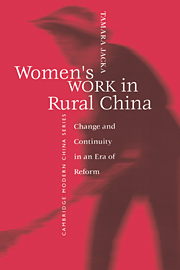Book contents
- Frontmatter
- Contents
- List of Tables
- Acknowledgements
- Abbreviations
- Introduction
- 1 Theorising gender
- 2 Patterns from the past
- 3 Post-Mao reforms
- 4 Families
- 5 Education and politics
- 6 Domestic work
- 7 Agriculture
- 8 Entrepreneurs on the farm
- 9 Industry
- 10 Conclusion
- Appendix 1 Summary of information on sample families in rural Beijing, Shandong and Sichuan
- Appendix 2 Employment in sample township enterprises in rural Beijing, Shandong and Sichuan
- Notes
- Bibliography
- Index
3 - Post-Mao reforms
Published online by Cambridge University Press: 20 March 2010
- Frontmatter
- Contents
- List of Tables
- Acknowledgements
- Abbreviations
- Introduction
- 1 Theorising gender
- 2 Patterns from the past
- 3 Post-Mao reforms
- 4 Families
- 5 Education and politics
- 6 Domestic work
- 7 Agriculture
- 8 Entrepreneurs on the farm
- 9 Industry
- 10 Conclusion
- Appendix 1 Summary of information on sample families in rural Beijing, Shandong and Sichuan
- Appendix 2 Employment in sample township enterprises in rural Beijing, Shandong and Sichuan
- Notes
- Bibliography
- Index
Summary
AFTER Mao Zedong's death and the arrest of the Gang of Four in 1976, Deng Xiaoping, and other leaders whom the Gang of Four had opposed, rose to prominence. They promoted values and goals very different from those espoused under the previous regime, and introduced policies for radical economic and social reform. In rural areas, this turn around was to have an impact on the economy and on social relations as profound as that caused by the collectivisation drive of the 1950s, which it was now reversing.
SHIFTS IN STATE IDEOLOGY
In the first phase of post-Mao reform, between 1978 and 1980, the state leaders' attention was concentrated on the consolidation of their own power, and structural reforms were implemented only gradually. During this early period, nevertheless, important shifts in state ideology and political and economic theory were expressed. The Deng leadership distanced itself from the previous regime by criticising the latter's ‘excessive’ political radicalism and egalitarianism, promoting instead the depoliticisation of ordinary life, economic pragmatism, an improvement of living standards and balanced economic growth. The latter two goals were to be achieved through the ‘four modernisations’ a greater opening to the outside world, more attention to the development of agriculture, consumer industries and services, greater division of labour and specialisation, and the promotion of material incentives and individual striving.
These broad shifts in ideology paved the way for radical structural change.
- Type
- Chapter
- Information
- Women's Work in Rural ChinaChange and Continuity in an Era of Reform, pp. 40 - 53Publisher: Cambridge University PressPrint publication year: 1997

